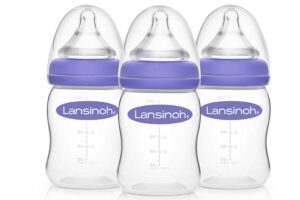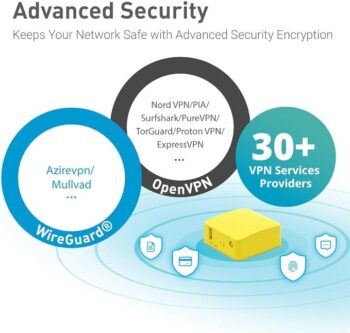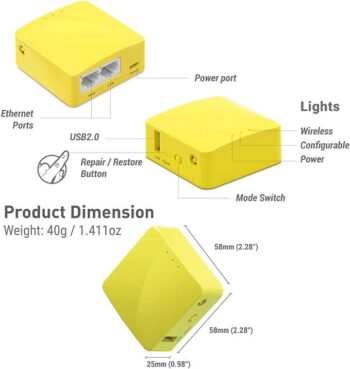What is VPN and How to Use It for Personal Use
A VPN, or Virtual Private Network, is a tool that allows users to create a secure and private connection to the internet. It works by routing your internet traffic through a remote server and encrypting your data, making it difficult for anyone to intercept or spy on your online activity. VPNs are commonly used by businesses and organizations to protect sensitive data, but they can also be used for personal purposes.
Using a VPN for personal use can provide a number of benefits. For one, it can help protect your privacy and security online. By encrypting your data and hiding your IP address, a VPN can prevent hackers, advertisers, and even your internet service provider from tracking your online activity. Additionally, a VPN can allow you to access content that may be restricted in your region, such as streaming services or websites that are blocked by your government or internet service provider. However, it’s important to note that not all VPNs are created equal, and some may actually compromise your privacy and security rather than protect it.
Understanding VPNs
A VPN, or Virtual Private Network, is a secure and private connection between a user’s device and the internet. It allows the user to access the internet through a remote server, masking their IP address and encrypting their online activity.
VPNs are commonly used to protect personal data and privacy, especially when using public Wi-Fi networks. They can also be used to bypass geographic restrictions and access content that may be blocked in certain regions.
VPNs work by creating a secure tunnel between the user’s device and the VPN server. This tunnel encrypts all data that passes through it, making it unreadable to anyone who may intercept it. The VPN server then sends the encrypted data to its final destination on the internet.
There are two types of VPNs: remote-access VPNs and site-to-site VPNs. Remote-access VPNs allow individual users to connect to a private network from a remote location, while site-to-site VPNs connect entire networks together.
In order to use a VPN, a user must first sign up for a VPN service and download the necessary software. The user then selects a VPN server to connect to and enters their login credentials. Once connected, the user’s internet traffic is routed through the VPN server, providing an additional layer of security and privacy.
It is important to note that while VPNs can provide an additional layer of security and privacy, they are not foolproof. Users should still practice safe browsing habits and avoid sharing sensitive information online. Additionally, some websites and services may block access from VPNs, so users should be aware of any potential limitations.
The Importance of Privacy
In today’s digital age, privacy has become a crucial concern for individuals. With the increasing use of the internet, personal data is constantly being collected, stored, and shared online. This has led to a rise in cyber threats, such as identity theft, hacking, and online surveillance. Therefore, it is essential to take steps to protect one’s privacy online.
Using a Virtual Private Network (VPN) is an effective way to ensure online privacy. A VPN encrypts the user’s internet traffic and routes it through a secure server, making it difficult for anyone to intercept or monitor the user’s online activity. This ensures that the user’s personal data and online identity remain private and secure.
Privacy is not just about protecting personal data, but also about maintaining one’s anonymity online. By using a VPN, users can browse the internet without revealing their true IP address or location. This can be especially important for individuals who live in countries with strict internet censorship laws, as a VPN can help them bypass these restrictions and access content that would otherwise be blocked.
In conclusion, privacy is a fundamental right that should be protected both offline and online. Using a VPN is an effective way to ensure online privacy, maintain anonymity, and protect personal data from cyber threats. By taking steps to protect one’s privacy, individuals can enjoy a safe and secure online experience.
How VPNs Work
VPNs work by establishing a secure connection between a user’s device and a VPN server. The VPN server acts as a middleman between the user’s device and the internet. When a user connects to a VPN server, the server creates a secure tunnel between the user’s device and the server. This tunnel is encrypted, which means that any data that passes through it is protected from prying eyes.
The process of creating a secure tunnel is known as tunneling. Tunneling is achieved by encapsulating the user’s data within an encrypted packet. This packet is then sent through the secure tunnel to the VPN server. Once the packet reaches the VPN server, it is decrypted and sent on to its final destination on the internet.
VPNs can be used for a variety of purposes, including accessing geo-restricted content, protecting personal information, and securing online communications. To use a VPN, a user must first subscribe to a VPN service. The VPN service will provide the user with a VPN client, which is a software application that is used to connect to the VPN server.
When a user connects to a VPN server, their device is assigned a new IP address. This IP address is usually located in a different country than the user’s actual location. This allows the user to access content that is normally restricted in their location.
In addition to providing access to geo-restricted content, VPNs also provide a secure way to transfer data. By encrypting data and creating a secure tunnel, VPNs protect sensitive information from hackers and other malicious actors.
Overall, VPNs are a useful tool for anyone who wants to protect their online privacy and access content that is normally restricted in their location. By creating a secure tunnel between a user’s device and a VPN server, VPNs provide a safe and secure way to access the internet.
VPN and Internet Service Providers
When using the internet, your Internet Service Provider (ISP) can see your internet traffic and your browsing history. This can be a privacy concern for many people. However, by using a VPN, you can encrypt your internet traffic and hide your browsing history from your ISP.
When you connect to a VPN, your internet traffic is routed through an encrypted tunnel to the VPN server. This means that your ISP can only see that you are connected to a VPN, but cannot see your actual internet traffic. This is because the VPN encrypts your internet traffic, making it unreadable to anyone who intercepts it.
Using a VPN may also help to improve your internet speed, as some ISPs may throttle or slow down your internet speed for certain websites or activities. By using a VPN, your ISP cannot see what websites you are visiting or what activities you are doing, and therefore cannot slow down your internet speed.
It is important to note that not all VPNs are created equal, and some may actually slow down your internet speed. It is recommended to do your research and choose a reputable VPN provider that offers fast internet speeds and strong encryption.
Overall, using a VPN for personal use can be a great way to protect your privacy and improve your internet speed.
Securing Your IP Address
When using the internet, your IP address is the unique identifier that is used to track your online activity. This information can be used to identify you, your location, and your online behavior. To protect your privacy and security, it is important to secure your IP address.
One way to secure your IP address is by using a VPN. A VPN encrypts your internet traffic and routes it through a secure server, making it difficult for anyone to track your online activity. Encryption is the process of converting your data into a code that only authorized parties can read. This ensures that your online activity remains private and secure.
IPSec is a commonly used encryption protocol that provides secure communication between two devices. It is often used in VPNs to protect data as it travels over the internet. With the increasing use of IPv6, which has more IP addresses than IPv4, it is important to use encryption to protect your online activity.
By using a VPN, you can also access content that may be restricted in your location. This is because a VPN can make it appear as though you are accessing the internet from a different location, allowing you to bypass geo-restrictions.
Overall, using a VPN is an effective way to secure your IP address and protect your online activity.
Browsing Safely with VPN
A VPN or Virtual Private Network is a security tool that encrypts the user’s internet traffic and hides their IP address. This makes it difficult for third parties such as hackers, internet service providers (ISPs), and websites to track the user’s online activities.
When browsing the internet without a VPN, websites can easily track the user’s browsing history and collect data about their online behavior. They can also use cookies to track the user’s activity across multiple websites. This can be used to create a detailed profile of the user’s interests and preferences, which can then be sold to advertisers or used for other purposes.
Using a VPN can help protect the user’s privacy by hiding their IP address and encrypting their internet traffic. This makes it difficult for websites to track the user’s browsing history and collect data about their online behavior.
In addition, using a VPN can also help protect the user’s data from hackers and other malicious actors. When connected to a public Wi-Fi network, for example, a VPN can help prevent others from intercepting the user’s internet traffic and stealing their personal information.
It is important to note, however, that using a VPN does not provide complete anonymity online. Websites can still use browser fingerprinting techniques to identify the user’s device and track their online activities. In addition, not all VPNs are created equal, and some may actually be less secure than browsing without a VPN. It is important to do research and choose a reputable VPN provider.
Overall, using a VPN can be an effective way to protect one’s privacy and security while browsing the internet. By encrypting internet traffic and hiding the user’s IP address, a VPN can help prevent websites, ISPs, and hackers from tracking the user’s online activities and stealing their personal information.
VPN for Secure Streaming
When it comes to streaming content online, a VPN can provide an added layer of security and privacy. By using a VPN, users can encrypt their internet traffic and hide their IP address, making it more difficult for hackers and other third parties to track their online activity.
One of the most popular streaming services, Netflix, has different content libraries based on the user’s location. By using a VPN, users can bypass these geo-restrictions and access content that may not be available in their region. However, it’s important to note that Netflix actively blocks VPN connections, so users may have to try different VPN servers to find one that works.
Similarly, YouTube and BBC iPlayer may also have geo-restrictions on their content. By using a VPN, users can access these services from anywhere in the world and enjoy their favorite shows and videos without any limitations.
It’s important to choose a VPN that offers fast and reliable connections, especially when streaming high-quality video content. Additionally, users should ensure that the VPN they choose has servers in the countries they want to access streaming services from.
Overall, a VPN can provide a secure and private way to enjoy streaming services without any geographic limitations.
Using VPN on Public Wi-Fi
When connecting to public Wi-Fi networks, it is important to be aware of the potential security risks. Public Wi-Fi networks, especially free ones, are often unsecured and can leave your personal information vulnerable to hackers and other malicious actors.
Using a VPN (Virtual Private Network) can help mitigate these risks by encrypting your internet traffic and making it more difficult for anyone to intercept or access your data. When connected to a VPN, your internet traffic is routed through a secure server, which helps protect your online privacy and security.
It is highly recommended to use a VPN when connecting to public Wi-Fi networks, especially if you are accessing sensitive information such as banking or personal accounts. VPNs can also help bypass any restrictions or blocks put in place by the Wi-Fi network provider, allowing you to access content that may be otherwise restricted.
When selecting a VPN provider, it is important to choose a reputable one that does not log your internet activity and has strong encryption protocols. Some popular VPN providers include NordVPN, ExpressVPN, and CyberGhost.
In summary, using a VPN when connecting to public Wi-Fi networks is a smart and easy way to protect your online privacy and security. By encrypting your internet traffic and routing it through a secure server, you can help prevent hackers and other malicious actors from accessing your personal information.
Protecting Against Hackers and Advertisers
VPN not only protects your online privacy but also provides security against hackers and advertisers. Hackers can gain access to your personal data by intercepting your internet traffic. They can use this information to steal your identity, financial details, and other sensitive information. Advertisers can also track your online activities and use this data to target you with ads.
By using a VPN, your internet traffic is encrypted, making it difficult for hackers to intercept and read your data. VPNs also use firewalls to protect against man-in-the-middle attacks and other cybercriminal activities. Moreover, VPNs can block ads and prevent advertisers from tracking your online activities.
In addition to protecting against hackers and advertisers, VPNs also safeguard against malware and other online threats. VPNs can detect and block malicious websites and prevent malware from infecting your device.
Overall, using a VPN for personal use provides an extra layer of protection against online threats. It ensures that your online activities remain private and secure.
Choosing the Right VPN
When it comes to choosing a VPN, there are a few factors to consider. One of the most important things to consider is whether you want to use a free or premium VPN. Free VPNs are often slower and less reliable than their premium counterparts, but they can be a good option if you’re on a tight budget.
If you decide to go with a premium VPN, there are several well-known providers to choose from, including NordVPN, ExpressVPN, and PureVPN. These providers offer reliable service and have a user-friendly interface that makes it easy to connect to a VPN server.
Another important factor to consider when choosing a VPN is reliability. You want to choose a VPN provider that has a proven track record of providing secure and reliable service. This is especially important if you plan to use the VPN for personal use, such as accessing sensitive information or conducting online banking transactions.
Finally, it’s important to choose a VPN that is user-friendly. A good VPN provider should have a simple interface that makes it easy to connect to a VPN server and adjust settings as needed. This is especially important if you’re new to using VPNs and need a provider that offers easy-to-understand instructions and support.
In summary, when choosing a VPN, it’s important to consider whether you want a free or premium provider, the reliability of the provider, and the user-friendliness of the interface. By taking these factors into consideration, you can choose a VPN that meets your needs and provides the security and privacy you need when using the internet.
VPN and Censorship
VPN technology has become an essential tool for people who want to bypass censorship and access information that is restricted in their region. Censorship is a common practice in many countries, where governments control the flow of information by blocking access to certain websites or online services.
A VPN can help users bypass censorship by encrypting their online traffic and routing it through a server located in a different country. This makes it difficult for governments to monitor or block access to specific websites or services. VPNs can also help users bypass geo-blocking, which is a practice used by websites and online services to restrict access based on the user’s location.
In countries where government surveillance is a concern, VPNs can provide a layer of privacy and security. By encrypting their online traffic, users can prevent government agencies from monitoring their online activities and collecting personal data.
However, it is important to note that not all VPNs are created equal. Some VPN providers may keep logs of user activity, which could potentially be accessed by government agencies. It is important to choose a reputable VPN provider that has a strict no-logs policy and uses strong encryption protocols.
In summary, VPNs can be a powerful tool for bypassing censorship, geo-blocking, and government surveillance. However, users should be cautious when choosing a VPN provider and ensure that their online activities remain private and secure.
VPN for Gaming
Using a VPN for gaming can have both advantages and disadvantages. One of the main benefits is that it can improve the gaming experience by reducing latency and improving connection speeds. This is especially true for gamers who are playing online games that require a stable and fast internet connection.
By using a VPN, gamers can connect to servers that are located closer to the game server, which can reduce the distance that data has to travel. This can result in a more stable connection and lower ping times, which can reduce lag and improve the overall gaming experience.
However, using a VPN can also have some drawbacks. One of the main disadvantages is that it can increase latency if the VPN server is located far away from the gamer. This can result in slower connection speeds and higher ping times, which can negatively impact the gaming experience.
Another potential drawback of using a VPN for gaming is that it can increase the risk of being banned by game servers. This is because some game servers may view the use of a VPN as a violation of their terms of service, which could result in a ban.
Overall, using a VPN for gaming can be beneficial for some gamers, but it is important to weigh the potential benefits and drawbacks before deciding to use one. Gamers should also be aware of the potential risks associated with using a VPN, such as increased latency and the risk of being banned by game servers.
Advanced VPN Features
In addition to the basic features of a VPN, there are several advanced features that can enhance your online privacy and security. Here are some of the most important ones to consider:
Protocols
VPN protocols determine how data is transmitted between your device and the VPN server. Some of the most common protocols include OpenVPN, L2TP/IPSec, and PPTP. OpenVPN is considered the most secure and reliable protocol, while PPTP is the least secure. It’s important to choose a VPN provider that supports the protocol you prefer.
Kill Switch
A kill switch is a feature that automatically disconnects your device from the internet if the VPN connection drops. This prevents your IP address and other sensitive information from being exposed. Make sure your VPN provider offers a kill switch and that it’s enabled.
Bandwidth
Some VPN providers limit your bandwidth, which can slow down your internet connection. Look for a VPN provider that offers unlimited bandwidth to ensure fast speeds.
PPTP
PPTP stands for Point-to-Point Tunneling Protocol. It’s an older protocol that’s less secure than newer options like OpenVPN. If possible, avoid using PPTP.
Location Spoofing
Location spoofing allows you to appear as if you’re accessing the internet from a different location than you actually are. This can be useful for accessing geo-restricted content or for maintaining your privacy. Look for a VPN provider that offers servers in the locations you need.
Split Tunneling
Split tunneling allows you to choose which apps and websites use the VPN connection and which ones use your regular internet connection. This can be useful if you only want to use the VPN for certain activities. Not all VPN providers offer split tunneling, so be sure to check if it’s important to you.
By taking advantage of these advanced VPN features, you can ensure that your online activity is private and secure.
Additional Security Measures
While VPNs are an excellent way to secure your online activity, there are additional measures you can take to further protect yourself.
Password Manager
Using a password manager can help you generate strong, unique passwords for each of your online accounts. This reduces the risk of a hacker accessing all of your accounts if they manage to crack one password.
Multi-Factor Authentication
Multi-factor authentication (MFA) adds an extra layer of security to your accounts by requiring a second form of identification, such as a fingerprint scan or a code sent to your phone. This makes it much more difficult for a hacker to gain access to your accounts, even if they have your password.
Sensitive Data
If you handle sensitive data, such as medical records or financial information, it’s important to take extra precautions. Consider encrypting your files and using a VPN when accessing them.
Trackers
Many websites use trackers to monitor your online activity and collect data about you. Using a VPN can help block these trackers and keep your information private.
Dark Web
The dark web is a hidden part of the internet that is not accessible through traditional search engines. It is often used for illegal activities, such as buying and selling stolen data. Using a VPN can help protect you from the risks associated with accessing the dark web.
Site-to-Site VPN
Site-to-site VPNs are used to connect multiple networks together, such as branch offices or data centers. They provide a secure connection between the networks and can help protect sensitive data.
Intranet
An intranet is a private network used by an organization to share information and resources. Using a VPN to access the intranet from outside the organization’s network can help ensure that the connection is secure.
Web Traffic
Using a VPN can help protect your web traffic from prying eyes. This is particularly important if you are using public Wi-Fi, which is often not secure.
Frequently Asked Questions
How can VPN improve my online security?
A VPN can improve your online security by encrypting your internet traffic and routing it through a remote server. This makes it difficult for hackers, government agencies, or other third parties to intercept your online activities and steal sensitive information such as passwords, credit card details, or personal data.
What are the benefits of using a VPN for personal use?
Using a VPN for personal use can provide several benefits, such as:
- Increased online privacy and security
- Access to geo-restricted content and websites
- Protection against online surveillance and tracking
- Safe and secure browsing on public Wi-Fi networks
- Protection against ISP throttling and censorship
Can VPN protect my home WiFi network?
Yes, a VPN can protect your home WiFi network by encrypting all the internet traffic that passes through it. This can prevent unauthorized access to your network and protect your devices from cyber threats such as malware, viruses, or hacking attempts.
What is the difference between a personal VPN and a work VPN?
A personal VPN is designed for individual use and is typically used to protect personal privacy and security. A work VPN, on the other hand, is used by organizations to provide secure remote access to their employees and protect their sensitive data and network resources.
Is it necessary to pay for a personal VPN?
While there are free VPN services available, paid VPN services generally offer better security, faster speeds, and more reliable connections. If you value your online privacy and security, it is recommended to invest in a reputable paid VPN service.
Are there any free VPN services that are reliable for personal use?
While there are some free VPN services that are reliable for personal use, it is important to be cautious as many free VPNs have been known to collect and sell user data or inject ads into web pages. Some of the reputable free VPN services include ProtonVPN, Windscribe, and TunnelBear, but it is always recommended to do your own research and read reviews before choosing a free VPN service.







